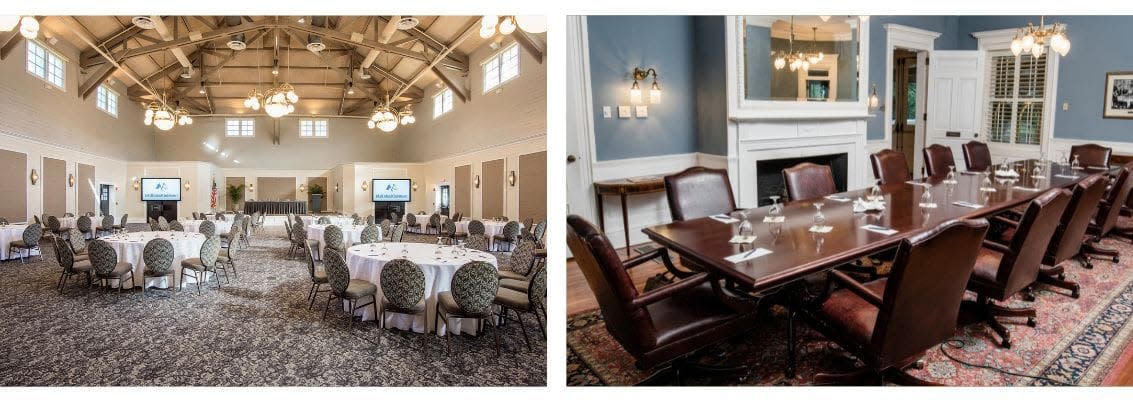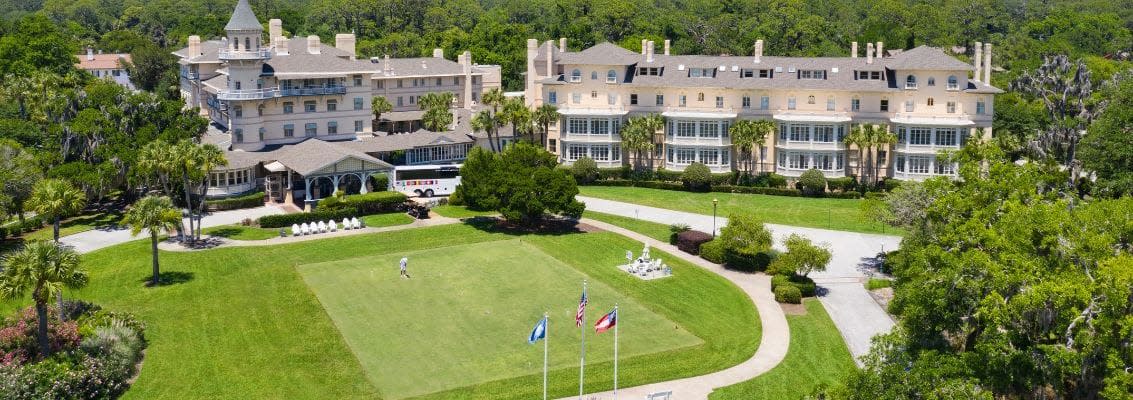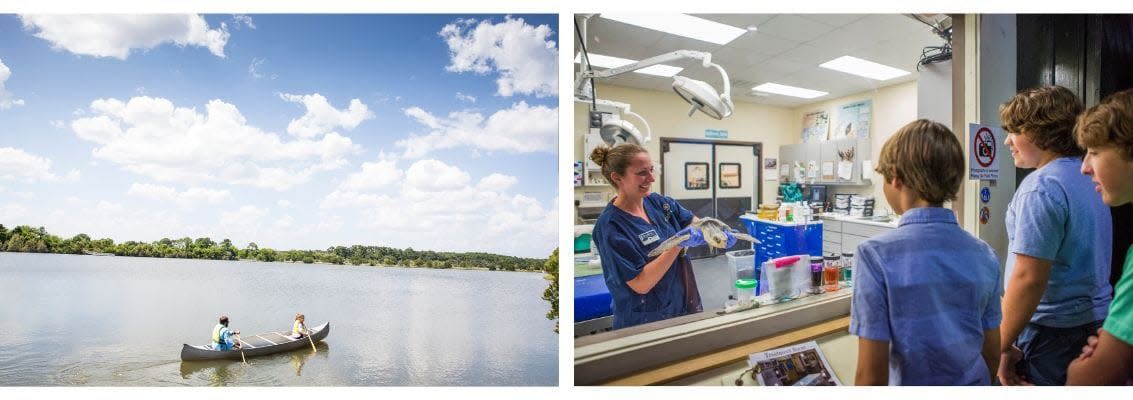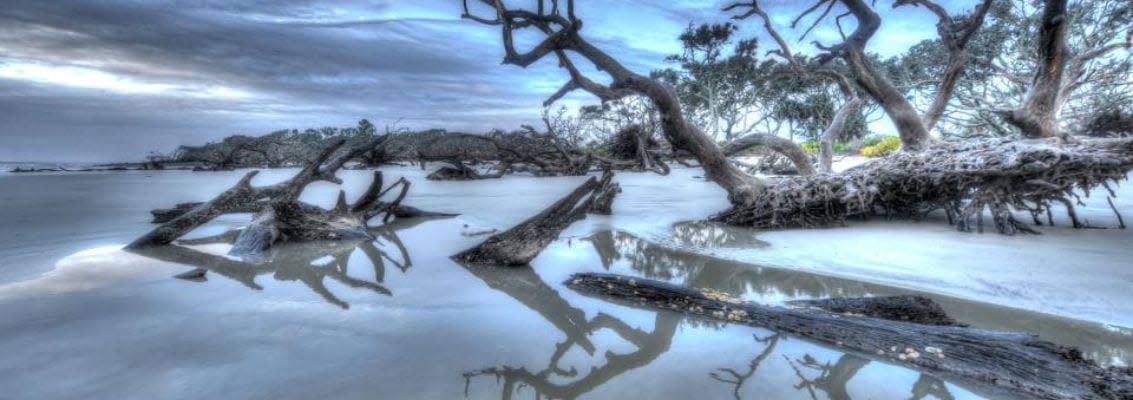Maybe it’s the live oak trees festooned with Spanish moss as well as the salt-tinged breezes courtesy of the Atlantic Ocean. Or perhaps it's the stately Queen Anne-style Clubhouse and the lush green lawn where guests play leisurely rounds of croquet. It could be the preppy umbrellas and swaying palms by the pool.
Thread together, these vignettes at the iconic Jekyll Island Club Resort have a knack for whisking guests away to the Gilded Age Era as soon as they step foot on the grounds of the coastal Georgia conference resort.
Serene and peaceful, Jekyll Island is the southernmost island on the strand of Golden Isles, which are the barrier islands known for orchestrating golden sunsets so scenic that they draw applause during nightly boardwalk rituals as locals and visitors gather to watch the sun slip behind the horizon. Ten miles of shoreline trace the 5,550-acre island that’s made up of marshes and dunes. Here, the pace slows down so much that the “Turtle Crossing” signs on the island almost seem metaphorical. But, really, preservation is a pride point on Jekyll Island, which is home to the Georgia Sea Turtle Center, Georgia's first sea turtle rehabilitation, research and education facility.
Beyond the unique beauty of its natural habitat, though, Jekyll Island and the club bearing its name also have a rich history. Since the turn of the century, the Jekyll Island Club Resort has been heralded as one of the country’s most sought-after and exclusive places to meet and retreat. In fact, the club hosted titans of industry like J.P. Morgan, William Rockefeller, Joseph Pulitzer, the Vanderbilts, Goulds, Astors and more.
By 1910, under the cover of night and using only first names to keep their identities secret, Senator Nelson Aldrich led a party of the country’s most powerful financiers to Jekyll Island where they laid the foundation for what would become the Federal Reserve system. Yet the island’s history is wide-ranging; a great copper pot was used to brew beer on Jekyll Island back in 1747 at what would become recognized as the state’s first brewery.
Suffice it to say, there’s something about Jekyll that inspires innovation.
Ahead, discover how the Jekyll Island Club Resort blends this fascinating history with its immaculate grounds and indelible Southern charm to provide a unique experience for meetings and events guests. Those who retreat here have access to flexible meeting space that includes riverside and oceanfront meeting venues and, yes, nods to the past with rooms like the Federal Reserve Room and the Morgan Center.
 Unique Meeting Spaces
Unique Meeting Spaces
The Jekyll Island Club Resort boasts 14,500 square feet of meeting space, with scenic venues that offer an inspired setting for groups of all sizes.
Meeting spaces range from the Morgan Center Ballroom that can accommodate 400 people to the sprawling Riverfront Lawn that has capacity for 250 guests. In all, there’s nine indoor meeting rooms and 10 outdoor venues.
The resort also has two cottages—the 13-room Crane Cottage and the 10-room Cherokee Cottage—that may be rented for private group functions and retreats. Both offer private meeting and banquet space. Meanwhile, the Ocean Club offers guests an all-suite boutique property right on the beach, with 40 one-bedroom suites with views of the Atlantic Ocean and oceanfront decks as well as a private beachside pool, hot tub and fire pit.

In addition to the meeting space, Jekyll Island has stellar amenities well suited for groups, including 63 holes of championship golf, 13 clay tennis courts, and a croquet lawn.
Guests interested in gleaning more about the property’s past can partake in history tours and pick up interesting tidbits. For instance, in 1915, the world’s first transcontinental phone call began at Jekyll Island Club connecting President Woodrow Wilson to Alexander Bell and his assistant, and in the 1920s, the club became the U.S. Golf Association’s testing ground for redesigned balls and steel-shaft clubs.
 A Focus on Preservation
A Focus on Preservation
The Jekyll Island Club was founded in 1885 by 50 of the country’s wealthiest men who bought 100 shares at $600 a share. That would translate to roughly about $17,000 today. By 1904, Munsey’s Magazine called the club “the richest, the most exclusive, the most inaccessible club in the world.”
The Jekyll Island Club Resort, which balances modern luxury with Gilded Age glamour, has been restored to its original splendor and today is recognized as a National Historic Landmark.
The barrier island that the resort sits on is carefully preserved, too: About a decade ago, the Jekyll Island Authority established a Conservation Program to preserve the island and its tidal marshes, as well as provide nature-based educational and recreational opportunities for visitors.
Those who come to visit Jekyll Island are immediately awestruck by the landscape of the coast.

“People recognize the live oak trees with the Spanish moss— that’s an icon for this part of the country—as well as the salt marshes, dunes, and sea oats,” said Yank Moore, Natural Resources Manager with Jekyll Island Authority. But as part of the land management efforts, conservationists have restored maritime grasses like the Muhly grass that has feathery, bright pink plumes that bloom on the island in the fall.
During downtime, meetings guests can enjoy the island’s natural beauty, whether that’s walking along the beach looking for shells like the sand dollars and porcelain-like wentletraps that feature tightly wound whorls or by borrowing a bike from the hotel to explore the 20 miles of trails. Located along the Atlantic Migratory Flyway, Jekyll Island is also a haven for birdwatching.
With conservation as a focus, the authority’s initiatives include protecting nesting loggerhead turtles and dune systems as well as leading ranger walks.
“We really try to do what we can to be better stewards of the island and make it feel like a state park,” Moore said.